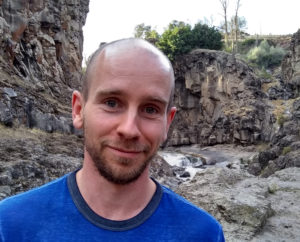What is your background? Where are you from? What do you study? What are you most interested in, scientifically?

I am originally from Portland, Oregon, USA., but Icurrently live in Vancouver, British Columbia, Canada. I am a M.Sc. student in botany, studying physiological plant ecology in Sean Michaletz’s lab at the University of British Columbia. I come from an unconventional academic background: I have a B.Sc. Hons. in Physics and a M.A. in history and philosophy of science; I have done academic research in mathematical glaciology and bioethics during these degrees, and outside academia I have worked in education and patent law. Broadly, I am interested in forest ecology and the effects of climate change. In the area of physiological ecology, I have so far focused on photosynthesis and temperature response. My current research uses temperature-controlled growth experiments to attempt to understand how photosynthetic temperature response “scales up” to control whole plant growth. I am generally interested in metabolic and thermal ecology, primary production, scaling, and limits to growth. I hope to expand on these themes by continuing as a PhD student in my current lab.
What are your goals for the upcoming course in Peru? How will you know if you’ve met these goals?
My goals are to understand how to organize and conduct an efficient and successful field campaign, to learn about the natural history and ecology of alpine grasslands, and to walk away with a high-quality scientific product. While the first two of my goals are a bit vague, perhaps, I believe that meeting these goals will be reflected in my future work. I hope that the products of our working group will be high-quality, publication-ready data, and I’ll know we’ve met this goal if our working group feels like publication of our results is warranted.
What are you most excited about, with respect to the upcoming course and trip?
I’m very excited for the opportunity to experience and learn about the natural history of unfamiliar ecosystems – both the Puna grassland, and hopefully the cloud forest below Wayqecha as well. I am also excited – and perhaps a bit nervous – to get to meet and interact with like-minded scientists, professors, and graduate students from around the world.
What do you anticipate people will think about climate change in Peru? Do you think most people will accept that the planet is warming, and that this is largely being caused by human activities? Or will this topic be controversial?
I believe that at this point, climate change has altered weather patterns and climatic averages to such an extent that differences are apparent to many people. People who live and work close to the land are especially unable to ignore changes in weather patterns, plant phenology, animal migration, and so forth. I expect that most people in Peru will be aware of and believe in the reality of climate change. What I am less certain of is the extent to which people in Peru will be aware of the role of anthropogenic greenhouse gas emissions in causing climate change. I am excited for the opportunity to learn more about public perceptions and understanding of science in a culture quite different from my own.
What do you know about public perceptions of climate change in your home country? What, if anything, have you experienced related to public perceptions of climate change?
I’ve lived most of my life in the USA and Canada – two countries which are more culturally similar than they often like to admit – and my view of public understanding of climate change is that it is sharply divided – while some people fervently believe in the reality and urgency of climate change, others either do not believe that the climate is warming, or they do not believe that it is caused by anthropogenic activities. My sense – purely anecdotal – is that the division in belief about climate change lines up with other deep divisions in America – the left-right political divide, the urban-rural divide. Increasingly, I believe people are unable to deny that the climate is changing, however one often still hears doubts as to the role of humans in causing climate change.